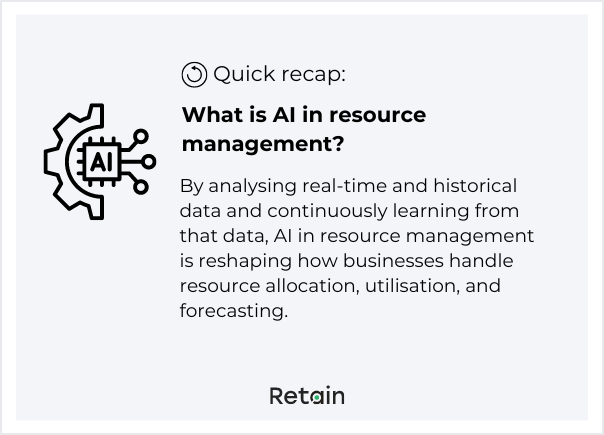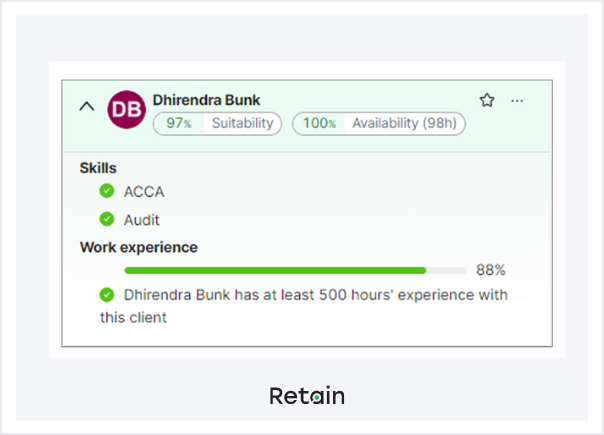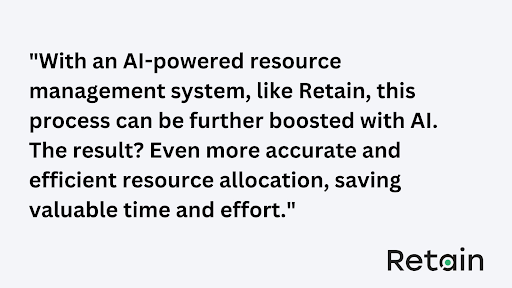AI in resource management is shaping the way we think about and handle resource allocation, utilisation, and forecasting. It's transforming traditional practices and enabling new capabilities not previously possible.
In this blog, we will demystify AI and explore its role in resource management. Plus, we'll look at how AI can work with human efforts to streamline resource management and how you can get started.
Let’s get into it.
The basics of AI in resource planning
AI in resource management is the application of artificial intelligence and machine learning to analyse real-time and historical data and continuously learning from that data. This helps reshape how organisations handle resource allocation, utilisation, forecasting, and more.

Put simply, AI in resource management helps you process massive amounts of data quickly, draw meaningful insights, and make data-driven decisions, instantly.
To put this into context, AI is transforming resource planning in the following key ways:
🔹 Intelligent resource recommendation: AI algorithms scrutinise your project specifics, required skills, and the availability of resources to suggest the best fits intelligently. Drawing on past data and patterns, AI offers forward-thinking recommendations to guarantee you're making the best use of your resources and enhancing the success of your projects.

🔹 Dynamic skill matching: AI-enabled systems ensure that your projects are always matched with the right resources with the needed skills. It learns from previous assignments, evaluates employee performance, and comprehends skill proficiencies to make intelligent suggestions tailored for you. The outcome? Improved project efficiency and skyrocketing client satisfaction.

🔹 Continued learning and optimisation: AI tirelessly learns and refines its resource allocation strategies and suggestions over time. As a result, it gets progressively smarter at catering to your unique resource management requirements.
So in summary, AI applies predictive analytics, simulations, and advanced optimisation to develop data-driven resource plans that get smarter over time. And it supports human resource planners by handling complex analyses. With AI, you're not just managing resources better today, but each day it's becoming increasingly effective for you.
But how is it used in practice? Let’s take a look next.
How is AI in resource management used in practice?
While resource management has come a long way with automation, with AI, these processes can be streamlined, and decision-making can become more data-driven and precise.
Take the example of a consulting firm. Traditionally, project managers would have to spend hours sifting through data to assign consultants to various projects based on skills, availability, and other factors.

With an AI-powered resource management system, like Retain, this process can be further boosted with AI. The system can analyse a variety of factors in real-time, including project requirements, each consultant's skills and experience, their availability, and even their past performance on similar projects.
The result? Even more accurate and efficient resource allocation, saving valuable time and effort.
AI also plays a significant role in resource forecasting, which is critical in strategic planning. By analysing historical data and identifying patterns, AI can predict future resource needs with a higher degree of accuracy than traditional methods. This means you can better prepare for the future, making strategic decisions about hiring, training, and project allocation.
AI doesn't just work in isolation. Instead, it blends automated technologies seamlessly with human expertise.
Of course, there are some pros and cons when it comes to AI in resource management. While AI brings speed, accuracy, and the ability to handle large volumes of data, humans bring strategic thinking, emotional intelligence, and nuanced decision-making. And the right tool will do all this securely too.
The combination of human and machine intelligence takes resource management to the next level. ??
So what are the key benefits?
7 key benefits of AI in resource management
The integration of AI into resource management offers tonnes of benefits that can dramatically improve the efficiency and effectiveness of professional services firms.
Here are some key advantages:
1. Improved efficiency and accuracy
AI can process vast amounts of data more rapidly and accurately, making resource scheduling more efficient. By analysing a range of factors, such as skill sets, project requirements, and individual availability, AI can identify the most suitable resources for each task or project, reducing the time and effort typically spent on this process. And crucially, it can learn from this insight too.
2. Enhanced forecasting capabilities
AI's ability to learn from past data and predict future trends can significantly improve resource forecasting. This allows for better planning and decision-making, reducing the likelihood of resource shortages or surpluses, and ensuring projects are adequately staffed.
3. Reduction of errors and bias
AI systems can help eliminate human error and bias from the resource allocation process. This ensures fair and objective decisions based on data, rather than relying on subjective judgment or intuition.
4. Strategic advantage
AI can provide a strategic advantage by freeing up resource managers' time from routine tasks, allowing them to focus on higher-value activities. This includes strategy development, building relationships, and managing more complex aspects of projects.
5. Enhanced agility
AI systems can adapt quickly to changes, making organisations more agile. Whether it's a sudden influx of projects or unexpected changes in resource availability, AI can help you respond swiftly and effectively.
6. Reduced costs
AI significantly reduces costs in resource management through precise demand forecasting. For example, by predicting staffing requirements, AI optimises payroll expenses, preventing over-staffing during slow periods and underutilisation during busy ones.
7. Enhanced speed and scalability
Finally, AI in resource management dramatically enhances speed and scalability. AI can identify and rectify inefficiencies quickly, enabling companies to adapt and scale their operations more efficiently. This rapid response mechanism not only increases productivity but also provides a robust foundation for strategic growth.
In essence, the use of AI in resource management can lead to increased productivity, more accurate decision-making, and an overall boost in business performance.
In the next section, we'll discuss some of the ways you can integrate AI in resource management.
Practical steps to integrate AI in resource management
Incorporating AI into your resource management processes can seem like a daunting task, but with the right approach, it can be made simple.
Here are some practical steps to consider:
#1: Understand your needs: Start by clearly defining what you hope to achieve with AI. Do you want to enhance resource allocation, improve forecasting, reduce costs, or perhaps all of these? Having clear objectives will help guide your approach.
#2: Evaluate your data: Assess the quality and volume of your existing data. Remember, AI systems rely on high-quality, consistent, and comprehensive data to function effectively. If there are gaps or inconsistencies in your data, these need to be addressed before you can fully integrate AI.
#3: Choose the right tools: AI resource management tools and platforms, such as Retain, each have their own strengths and specialisations. Take the time to research and select the tool that best suits your needs. Consider factors like functionality, ease of use, scalability, and support provided by the vendor.
#4: Review and refine: After the initial implementation, continually review and refine your AI systems. Are they meeting your objectives? What can be improved? Regular evaluation will help you make the most of your AI investment and ensure it continues to support your resource management needs effectively.
By following these steps, you can make the transition to AI-powered resource management smoother and more efficient.
Leveraging AI for efficient resource management
From enhanced efficiency and precision to significant cost reductions and improved scalability, AI in resource management offers a host of exciting benefits. As we've explored, integrating AI into resource management isn't without its challenges, but with a strategic approach and the right software, these hurdles can be navigated effectively.
We hope this post has provided you with a clearer understanding of AI's role in resource management and how it can propel your firm forward. Should you have any questions or require further information, feel free to reach out to our team at Retain.
If you're looking to optimise your resource management processes, gain actionable insights from your data, and equip your firm for the future, why not give Retain a try?


